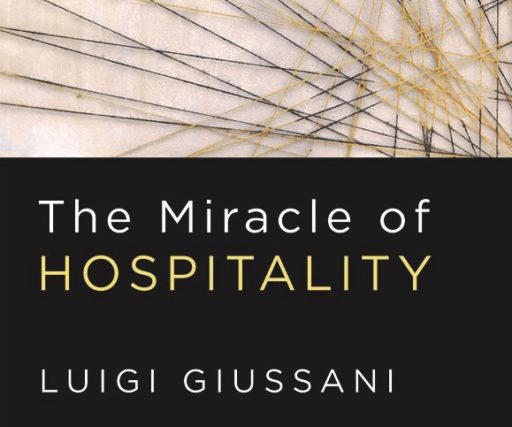We spoke with Luca Sommacal, president of the Welcoming Families Association—the organization that lies behind the talks and interviews by Luigi Giussani collected in The Miracle of Hospitality, recently translated into English and published by Slant Books.
This book contains talks and interviews by Fr. Luigi Giussani—specifically in relationship with the Welcoming Families Association, which you lead. Even though the book contains a history of your Association, could you just give us a brief explanation of your mission?
Welcoming Families is an Association for Social Advancement born over forty years ago in Milan, and then spread throughout all of Italy as well as a few other countries. In short, it is a network of families that accompany each other in the experience of welcoming, while committing to the value of hospitality as a good for the person and for society as a whole.
The Association is made up of more than 3,000 families who embrace each day the fragilities of the most vulnerable: children, through foster care and adoption, adolescents, disabled children, adults in need, and the elderly. What motivates us? To recognize the infinite mystery and the dignity of each human being. At the same time, to recognize the good that comes into our lives every time we open our door to a child or a stranger in need.
Fr. Giussani uses the word “gratuità” to explain the origin of hospitality. What is this “gratuitousness”?
In The Miracle of Hospitality, which contains a few dialogues that Father Giussani had with the leaders of our Association, Giussani defines gratuitousness as “love without profit,” and in another text he affirms: “Gratuitousness is love for the destiny of the other, period.”
Every act of welcome is a gesture of gratuitousness. There is no profit or calculation that shapes the relationship, but only unconditional love for the destiny of the other. We don’t need anything more than this love to welcome someone into our house and thus into our life. For this reason, gratuitousness is at the origin of every experience of welcoming or hospitality.
How can Fr. Giussani’s vision of hospitality inspire more people to make room in their lives for people in need?
In a beautiful letter which he wrote on the twentieth anniversary of our foundation, Father Giussani speaks of the intensity of life, the ultimate reason behind each of our gestures of hospitality, and the fascination that an experience like ours carries with it, allowing us to spread throughout the whole world: “Dear friends, your example illuminates for me the path of the future: a familiarity—or fraternity—that opens itself in an embrace without hesitation. And so, I urge you never to stop welcoming, imitating the gesture of Christ with the children that he met. If He, the Lord, turned to the little ones to show the way to those who were grown, you who are doing the same thing become a sign of the newness that, like a wave, expands from family to family, from the closest to the farthest, in a movement that is the beginning of a more humane society because it is made of people who are passionate for the destiny of humankind—you would give your life for one of these little ones!—you who have yourselves met the Factor that gives life and breath to everything. So, may everyone who encounters you feel himself or herself finally at home, that is, welcomed and secure like a child in the arms of his father.”
The core of your Association has been the work of adoption and foster care. But you have grown to meet other needs. Can you tell us about some of them?
Our Association is above all engaged in the support of families that welcome children in foster care or adoption, in situations that are often difficult and even dramatic.
But in the last few years we have found ourselves involved directly in facing historical social emergencies, like offering welcome to sub-Saharan migrants, and more recently, from 2015 to 2019, hosting children from the Donbass region in Ukraine in the summer months, and in these last months, refugees from the war.
In collaboration with other non-profits, we have heard from over 800 families ready to welcome Ukrainian refugees. More than 300 families have now actually hosted these refugees.
We have journeyed alongside every single host family, sustaining them and supporting the refugees through Italian classes, healthcare, and job searches.
We have only confronted a small part of the immense need that has emerged in these last years, but we have without doubt contributed to that important chain of solidarity that links thousands of families throughout Europe.
Do Fr. Giussani’s words still help you face the circumstances of the twenty-first century?
Certainly! The teaching of Father Giussani is more current than ever and helps us face the challenges of our time. The dialogues collected in The Miracle of Hospitality represent for all of us, and for those who will read them, a point of comparison with Giussani’s humanity. Giussani was fascinated by what he saw when he visited our families. I cite: “There does not exist any greater act than hospitality: from the most radical hospitality of adoption, to the hospitality of a lunch or the offering of a roof to someone who is passing through Milan for the night. One of the most beautiful things that I have seen among my friends is this association, this fabric of families who are open to hosting anyone.”
This passionate observation illumines our gesture of welcoming, helping us rediscover the extraordinary newness that these gestures bring to the life of individuals and of the whole society.
We are immersed in a world where solitude ravages people, in a throwaway culture, as Pope Francis often reminds us; and where the family is often considered a protective nest rather than the hub of a network that is interconnected with the world.
In this context, citing the Letter to the Hebrews, Father Giussani reminds us of the infinite value of each of our children, of each person welcomed: “Do not forget to show hospitality to strangers, for by so doing some people have shown hospitality to angels without knowing it.” And he comments: “It is not that they are angels: they are more than angels! They are children of God, part of the mystery of the person of Christ.” This experience challenges the dominant mentality and plants the seed of the construction of a more humane society.
In a world where the family is relegated to an almost unnatural solitude, here instead is the testimony of families that help each other to face the inevitable difficulties that every experience of welcome brings with it, to bring to light their discoveries, to support the deepest motivations of every gesture: “To help anyone who is in your Association is right because of the scope of the Association.… The greatest help we can give the members of the Association is to illuminate them as to the true ‘why’ for which their generosity is set in motion.”
Our work, which is born from the experience originated by Father Giussani and by his teachings, has been engaged over the years—as I mentioned—in confronting circumstances as they arise, like the war in Ukraine from its beginning. What began in 2015 has prepared our Association to engage now in the welcoming of refugees: in looking at the operational aspects and in facing the difficulties that have arisen, but above all in helping us understand that every gesture of welcome, even the smallest or shortest, has the world as its horizon and contributes to the building of history.
Do you hope that the Welcoming Families Association will expand to other countries, perhaps even into North America?
The attractive capacity of an experience like ours is surprising to me: over the years it has spread to Spain, Switzerland, Romania, Brazil, and continues to fascinate families that, meeting us, get involved. A friendship is born that sustains the inevitable strains of giving hospitality, that helps to deepen the motives of every gesture of welcome and leads us to encounter other families: as I mentioned before, it generates a movement, the beginning of a more humane society.
A few families in North America already participate in the Association. They are dear friends, and it would be beautiful for them to get involved with others to share our experience. Yes, the hope is that our presence in North America can grow. The American people are naturally and historically welcoming: it would be a great contribution that we could give, but also receive.





